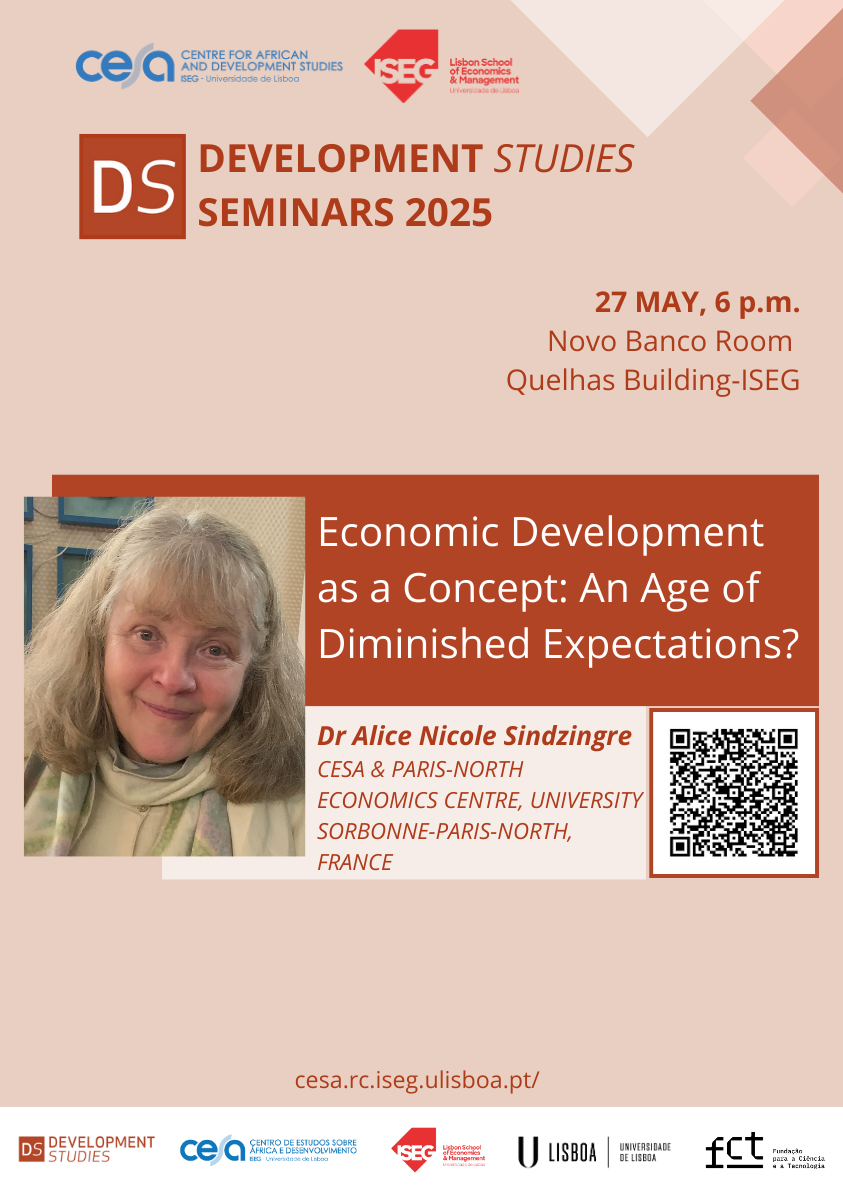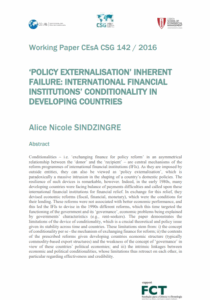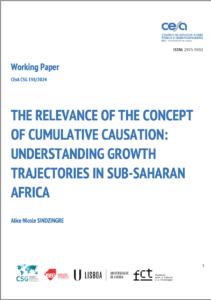Development Studies Seminars 2025 | Economic Development as a Concept: An Age of Diminished Expectations?
Os Development Studies Seminars são uma iniciativa que, desde 1991, promove a investigação conduzida nas áreas de estudo do Mestrado em Desenvolvimento e Cooperação Internacional (MDCI) do ISEG e do Programa de Doutoramento em Development Studies (PDED) da Universidade de Lisboa

Development Studies Seminars 2025
Tema: Economic Development as a Concept: An age of diminished expectations?
Oradora: Professora Doutora Alice Nicole Sindzingre (CEsA e Paris-North Economics Centre, Universidade Sorbonne-Paris-North, França)
Data: 27 de Maio de 2025 (terça-feira)
Hora: 18h00-20h00
Local: Sala Novo Banco, 4.º Piso do Ed. Quelhas, ISEG (Entrada pela Rua do Quelhas 6 1200-731, Lisboa, Portugal)
Evento presencial e com entrada livre. Seminário em inglês.
Sobre Alice Nicole Sindzingre

Alice Nicole Sindzingre é Investigadora Associada no CEPN (Paris-North Economics Centre, University Paris-North, França), e no LAM Research Centre (“Africas in the World”, National Centre for Scientific Research/CNRS-SciencesPo-Bordeaux, França). Lecionou em 2008-2010 na SciencesPo-Paris e em 2010-2014 no departamento de economia da Universidade Paris-Nanterre. Em 2005-2008, ela escreveu a coluna mensal sobre as teorias do desenvolvimento económico no jornal francês Le Monde. Ela foi membro da Equipe Central do Relatório de Desenvolvimento Mundial 2000-1 do Banco Mundial sobre pobreza. Realizou pesquisas sobre economia do desenvolvimento e economia política, bem como trabalho de campo na África Subsaariana (principalmente na África Ocidental). Ela publicou um grande número de artigos em revistas académicas e editou livros sobre uma ampla gama de tópicos, incluindo comércio internacional, integração regional, ajuda externa, relações China-África, armadilhas da pobreza, teoria das instituições e epistemologia da economia.
Publicações da autora com o CEsA:
 Working Paper n.º 142/2016: ‘Policy Externalisation’ Inherent Failure: International financial institutions’ conditionality in developing countries
Working Paper n.º 142/2016: ‘Policy Externalisation’ Inherent Failure: International financial institutions’ conditionality in developing countries
Resumo: Conditionalities – i.e. ‘exchanging finance for policy reform’ in an asymmetrical relationship between the ‘donor’ and the ‘recipient’ – are central mechanisms of the reform programmes of international financial institutions (IFIs). As they are imposed by outside entities, they can also be viewed as ‘policy externalisation’, which is paradoxically a massive intrusion in the shaping of a country’s domestic policies. The resilience of such devices is remarkable, however. Indeed, in the early 1980s, many developing countries were facing balance of payments difficulties and called upon these international financial institutions for financial relief. In exchange for this relief, they devised economic reforms (fiscal, financial, monetary), which were the conditions for their lending. These reforms were not associated with better economic performance, and this led the IFIs to devise in the 1990s different reforms, which this time targeted the functioning of the government and its ‘governance’, economic problems being explained by governments’ characteristics (e.g., rent-seekers). The paper demonstrates the limitations of the device of conditionality, which is a crucial theoretical and policy issue given its stability across time and countries. These limitations stem from: i) the concept of conditionality per se – the mechanism of exchanging finance for reform; ii) the contents of the prescribed reforms given developing countries economic structure (typically commodity-based export structures) and the weakness of the concept of ‘governance’ in view of these countries’ political economies; and iii) the intrinsic linkages between economic and political conditionalities, whose limitations thus retroact on each other, in particular regarding effectiveness and credibility.
Link: https://repositorio.ulisboa.pt/bitstream/10400.5/11719/1/wp142.pdf
Working Paper n.º 198/2024: The Relevance of the Concept of Cumulative Causation: Understanding growth trajectories in Sub-Saharan Africa

Resumo: Differences in growth trajectories among countries – including the possibility of divergence –, are a central issue in economics. Mainstream economics explain growth processes via varieties of neoclassical models, even improved with concepts such as institutions. Yet such models have difficulties in providing accurate accounts of the growth trajectories of many developing countries, notably low-income ones. It is argued that the growth paths of low-income countries are more appropriately explained by the theoretical framework that relies on the nexus of concepts of cumulative causation, non-linearities, threshold effects, self-reinforcing processes, irreversibility, path dependence and traps – though this approach remains marginal in mainstream economic analyses of growth and development. Firstly, this nexus of concepts is a powerful framework concerning the possibility and explanation of dynamic divergence regarding growth between countries, as it exhibits properties such as: the possibility of cumulative, dynamically self-reinforcing, processes; the existence of thresholds and tipping points; multiple equilibria. Secondly, cumulative causation, by definition, involves a combination of causes: its conceptual framework allows for the integration of several dimensions – economic, political, social, cognitive –, whose combination results in either virtuous or vicious circles. In developing countries, these causes (and their coalescence) typically consist in economic structures (e.g., commodity-based export markets), political institutions and social norms (predatory regimes, high inequality) as well as types of public policies.
Link: https://repositorio.ulisboa.pt/bitstream/10400.5/30144/1/Working%20Paper_198-2024_FINAL.pdf
Seminários da autora com o CEsA:
Leia mais:
Autor: Comunicação CEsA (comunicacao@cesa.iseg.ulisboa.pt)
Imagens: CEsA/Reprodução





